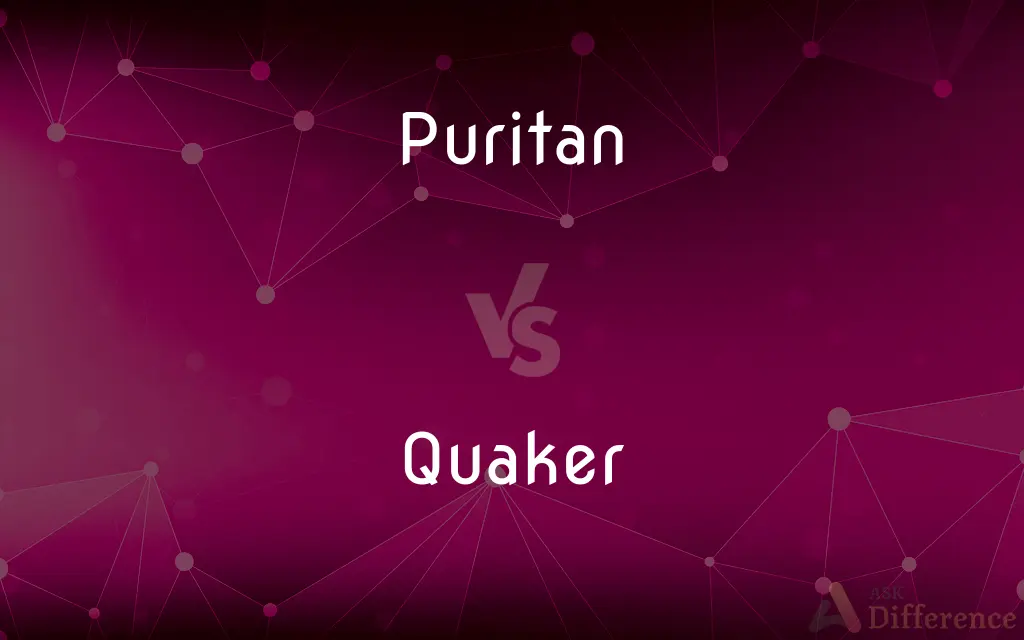Puritan vs. Quaker — What's the Difference?
By Tayyaba Rehman & Fiza Rafique — Updated on April 16, 2024
Puritans emphasized strict religious adherence and predestination, focusing on community and church governance; Quakers valued inner spirituality, pacifism, and equality, including more direct personal revelations.

Difference Between Puritan and Quaker
Table of Contents
ADVERTISEMENT
Key Differences
Puritans were known for their strict religious practices and adherence to a Calvinist doctrine, emphasizing predestination and a strong church leadership structure. On the other hand, Quakers, or the Religious Society of Friends, focused on the inner light of individual spirituality, allowing for a more personal connection with God without the need for ordained clergy.
Puritan communities were highly organized and structured around their church congregations, which influenced legal and social frameworks in their settlements. Whereas Quakers promoted a more egalitarian approach, opposing formal hierarchies in their meetings and advocating for gender and racial equality.
Puritans supported the idea of a covenant community where moral laws aligned with their interpretations of the Bible, leading to a society with strict codes of conduct and punishments. In contrast, Quakers emphasized personal morality and non-violence, leading them to be early proponents of abolitionism and women's rights.
In England, Puritans were involved in the English Civil War, advocating for strict religious reforms and even supporting regicide. Quakers, on the other hand, were pacifists, rejecting all forms of violence, which often led to their persecution by mainstream Christian groups.
Puritans believed in the visible saints' concept, meaning church membership was restricted to those who passed rigorous tests of personal piety and religious knowledge. Meanwhile, Quakers believed that God could reveal the truth directly to individuals, leading to a more inclusive community ethos based on direct spiritual experiences.
ADVERTISEMENT
Comparison Chart
Core Beliefs
Predestination, strict morality
Inner light, personal direct revelations
Church Structure
Hierarchical, clergy-led
Egalitarian, no clergy
Social Views
Conservative, community-focused
Progressive, equality-focused
Political Activity
Active in English Civil War
Pacifist, politically active in social reform
Approach to Scripture
Literal interpretation
Personal interpretation
Compare with Definitions
Puritan
Supporters of the English Civil War.
Many Puritans supported Cromwell during the English Civil War.
Quaker
Believe in the "inner light" of God in every person.
Quakers hold meetings where any member may speak as moved by the inner light.
Puritan
Members of a Protestant group advocating for purity of worship and doctrine.
The Puritans sought to cleanse the Church of England from its Catholic practices.
Quaker
Promoters of equality and social justice.
Quakers were among the first to advocate for the abolition of slavery.
Puritan
Advocates of moral and religious rigor.
Puritans enforced a code of conduct that aligned with their interpretation of the Bible.
Quaker
Advocates of direct revelation without the need for clergy.
Quakers believe that the divine speaks directly to each individual without intermediaries.
Puritan
Emphasized predestination.
Puritans believed that God had predestined select individuals for salvation.
Quaker
Known for their simple, unadorned mode of worship.
Quaker meetings often occur in plain rooms without symbols or decorations.
Puritan
Known for their influence in the Massachusetts Bay Colony.
The Puritans established a community based strictly on their theological beliefs.
Quaker
Members of the Religious Society of Friends, known for their pacifism.
Quakers have historically refused to participate in war.
Puritan
A member of a group of English Protestants who in the 1500s and 1600s advocated strict religious discipline along with simplification of the ceremonies and creeds of the Church of England.
Quaker
A member of the Society of Friends.
Puritan
Puritan A person who is very strict or austere in religious practice or moral outlook, especially someone who regards pleasure or luxury as sinful.
Quaker
Quaker
Puritan
Of or relating to the Puritans or Puritanism.
Quaker
(entomology) Any of various lycaenid butterflies of the genus Pithecops.
Puritan
Puritan Characteristic of a puritan; puritanical.
Quaker
One who quakes.
Puritan
A puritanical person.
Quaker
The nankeen bird.
Puritan
One who, in the time of Queen Elizabeth and the first two Stuarts, opposed traditional and formal usages, and advocated simpler forms of faith and worship than those established by law; - originally, a term of reproach. The Puritans formed the bulk of the early population of New England.
Quaker
A member of the Religious Society of Friends founded by George Fox (the Friends have never called themselves Quakers)
Puritan
One who is scrupulous and strict in his religious life; - often used reproachfully or in contempt; one who has overstrict notions.
She would make a puritan of the devil.
Quaker
One who quakes and trembles with (or as with) fear
Puritan
Of or pertaining to the Puritans; resembling, or characteristic of, the Puritans.
Puritan
Adheres to strict religious principles; opposed to sensual pleasures
Puritan
A person excessively concerned about propriety and decorum
Puritan
Morally rigorous and strict;
Blue laws
The puritan work ethic
Puritanic distaste for alcohol
She was anything but puritanical in her behavior
Common Curiosities
How did Puritan and Quaker approaches to scripture differ?
Puritans adhered to a literal and strict interpretation of the Bible, whereas Quakers emphasized personal interpretation guided by the inner light.
Can you explain the Puritan concept of "visible saints"?
The Puritans believed that only those who could demonstrate their election by God through a conversion experience and a pious life should be admitted to church membership.
What is the significance of the "inner light" in Quaker belief?
The "inner light" is the cornerstone of Quaker theology, signifying the direct and personal presence of God within every individual, guiding them morally and spiritually.
How did Quakers influence American social policies?
Quakers were instrumental in promoting and implementing progressive policies regarding slavery, prison reform, and education in the early United States.
What were the primary reasons for Puritan migration to America?
Puritans migrated to America primarily to escape religious persecution in England and to establish a community where they could practice their religion freely.
What role did the Puritans play in American history?
Puritans significantly influenced the religious, social, and political landscape of early New England, contributing to the region's development and governance.
How do Quaker meetings work?
Quaker meetings, or Meetings for Worship, are typically held in silence, where members speak as they are moved by the Holy Spirit, without a pre-arranged pastor or liturgy.
What historical conflicts have Quakers been involved in?
Despite their pacifist stance, Quakers have been involved in social conflicts, especially as advocates for peace and social justice, often clashing with mainstream societal views.
What impact did Puritanism have on community and social structure in their colonies?
Puritanism fostered a tightly-knit community with strict social rules, significantly influencing the legal and moral framework of their settlements.
How have Quakers been viewed by other religious groups?
Historically, Quakers have often been misunderstood and persecuted by other religious groups for their unconventional beliefs and practices, such as pacifism and their rejection of formal sacraments.
How did Puritan beliefs influence their approach to law and order?
Puritan beliefs strongly influenced their legal system, which was intertwined with their religious convictions, leading to laws that enforced moral conduct according to their biblical interpretation.
What are the core differences in religious practice between Puritans and Quakers?
Puritans emphasized preaching and reading scripture in a communal setting led by a minister, while Quakers practiced a silent, meditative worship style without a formal leader.
How do the lifestyles of Puritans and Quakers reflect their beliefs?
Puritans lived strict, disciplined lives that adhered closely to their religious doctrines, while Quakers lived simply and focused on inner spirituality, often reflected in their plain dress and straightforward speech.
How did Puritans view education?
Puritans placed a high value on literacy and education, primarily to enable the reading of the Bible, leading to the establishment of schools and colleges in New England.
What was the Quaker stance on gender equality?
Quakers were pioneers in promoting gender equality, often allowing women to take on roles within their communities that were typically reserved for men in other religious groups.
Share Your Discovery

Previous Comparison
Brochure vs. Poster
Next Comparison
Guangdong vs. GuangzhouAuthor Spotlight
Written by
Tayyaba RehmanTayyaba Rehman is a distinguished writer, currently serving as a primary contributor to askdifference.com. As a researcher in semantics and etymology, Tayyaba's passion for the complexity of languages and their distinctions has found a perfect home on the platform. Tayyaba delves into the intricacies of language, distinguishing between commonly confused words and phrases, thereby providing clarity for readers worldwide.
Co-written by
Fiza RafiqueFiza Rafique is a skilled content writer at AskDifference.com, where she meticulously refines and enhances written pieces. Drawing from her vast editorial expertise, Fiza ensures clarity, accuracy, and precision in every article. Passionate about language, she continually seeks to elevate the quality of content for readers worldwide.














































